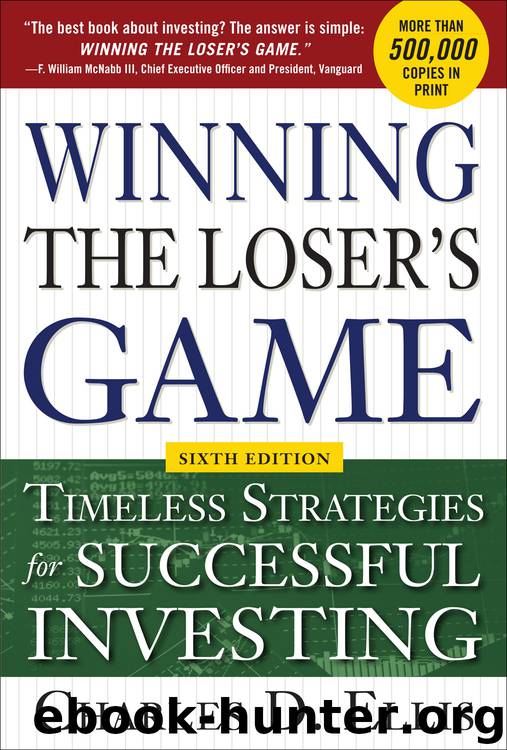Winning the Loser's Game by Charles Ellis

Author:Charles Ellis [Ellis, Charles]
Language: eng
Format: epub
Publisher: McGraw-Hill Education
Published: 2013-02-16T05:00:00+00:00
Endnotes
1. Irrational Exuberance (Princeton University Press, 2000), Robert Shiller’s eloquent and fact-founded review of the U.S. stock market at the height of the “new economy” euphoria, is a superb example of a rational appraisal.
2. Benjamin Graham, Security Analysis (New York: McGraw-Hill, 1934 edition).
CHAPTER 17
THE INDIVIDUAL INVESTOR
INDIVIDUAL INVESTORS ARE PROFOUNDLY DIFFERENT FROM institutional investors like pension funds and endowments. It’s not just that individual investors have less money. One difference is taxes. Active managers with typically over 100 percent annual turnover generate tax obligations that their investors must pay. So beware: Declared investment performance is before taxes. Another difference is decisive: Every individual is mortal. Mortality is a dominant reality for all individual investors. Of course the exact timing of this great reality is not known. But know as individuals and as investors that life is short.
Those of us who are earning incomes have a finite number of years in which to build our lifetime savings and invest for retirement security. And those who are no longer earning and saving have finite financial resources on which they will depend for the indefinite duration of their lives.
Individual investors’ money often takes on great symbolic meaning and can engage in investors’ emotions powerfully—all too often, too powerfully. While the key to success in investing is rationality, most investors can’t help letting their emotions get involved—and at certain market junctures even get the upper hand. Many investors feel that their money represents them and the worth of their lives (as entrepreneurs often identify their value or their self-worth with their companies). This “my money is me” syndrome is particularly common and virulent among elderly people and often causes irascible or even petty behavior. (If it happens to someone in your family, be tolerant: It’s probably just another way of expressing fear of death.)
Yet another important reality is that individual investors have considerable power to affect others—both financially and emotionally—with gifts and bequests made or not made, made larger or smaller than anticipated, or considered fair or unfair. The emotional power and symbolism of money are often more important than its economic power, and individual investors will be wise to deal carefully with both.
Individual investors, as we know, usually buy for reasons outside the stock market: They buy because they inherit money, get a bonus, sell a house, or, for any other happy reason, have money to invest as a result of something that has no direct connection to the stock market. Similarly, they sell stocks because a child is going off to college or they have decided to buy a home—almost always for reasons outside the stock market. Candidly, when individuals act because of reasons they think are inside the market, they are usually making a mistake; they are not in the center of the action, where the professionals and the expert analysts who serve them are making important decisions. They are either optimistic and late because the market has been rising or pessimistic and late during a falling market.
In addition, compared to the
Download
This site does not store any files on its server. We only index and link to content provided by other sites. Please contact the content providers to delete copyright contents if any and email us, we'll remove relevant links or contents immediately.
| Paganism | Wicca |
| Witchcraft |
Becoming Supernatural by Dr. Joe Dispenza(8215)
Crystal Healing for Women by Mariah K. Lyons(7930)
The Witchcraft of Salem Village by Shirley Jackson(7274)
Inner Engineering: A Yogi's Guide to Joy by Sadhguru(6793)
The Four Agreements by Don Miguel Ruiz(6765)
The Power of Now: A Guide to Spiritual Enlightenment by Eckhart Tolle(5781)
Secrets of Antigravity Propulsion: Tesla, UFOs, and Classified Aerospace Technology by Ph.D. Paul A. Laviolette(5371)
The Wisdom of Sundays by Oprah Winfrey(5160)
Room 212 by Kate Stewart(5119)
Pale Blue Dot by Carl Sagan(5007)
Fear by Osho(4737)
The David Icke Guide to the Global Conspiracy (and how to end it) by David Icke(4717)
Animal Frequency by Melissa Alvarez(4470)
Rising Strong by Brene Brown(4459)
How to Change Your Mind by Michael Pollan(4356)
Sigil Witchery by Laura Tempest Zakroff(4243)
Man and His Symbols by Carl Gustav Jung(4135)
The Art of Happiness by The Dalai Lama(4130)
Real Magic by Dean Radin PhD(4128)
